It’s time for some book reviews, today of the nonfiction variety. All six of these books have a faith component, but very different outcomes. From understanding God to wrestling with faith to getting clarity on cultural trends to addressing parenting issues, the authors here have drawn from Scriptural principles and ideas in some creative ways. But don’t take my word for it. . . let’s take a look at these books!
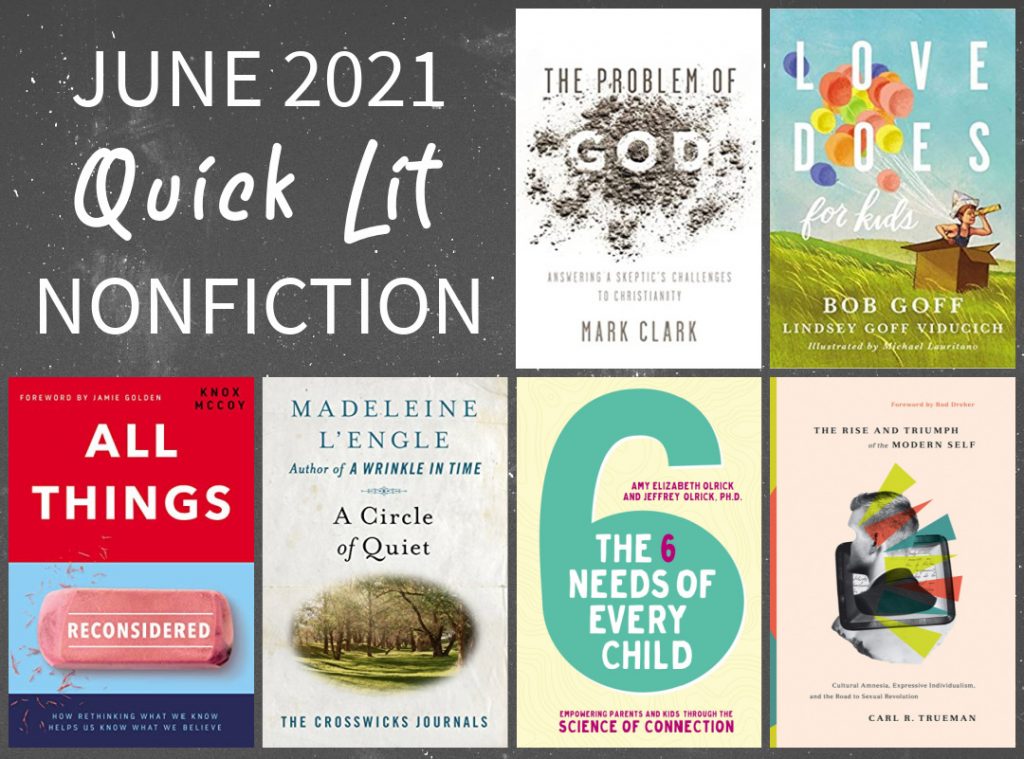
The Problem of God: Answering a Skeptic’s Challenges to Christianity, by Mark Clark: Written for an audience who doubts Christianity, this book from Canadian pastor Mark Clark offers comprehensive answers to the top ten questions people raise against God. As a former atheist with a difficult past, Clark is familiar with many of the rejections and hangups people might have towards Christianity, and he uses scientific evidence, logic, and theology to provide answers for individuals who might object to God based on science, sexuality, the existence of evil and suffering, hypocrisy, and more.
As someone who doesn’t really have “a problem with God,” I’m obviously not Clark’s intended reader, but this book helped solidify a lot of what I already believe and provided me with answers to many of the questions non-Christians have posed to me. I liked Clark’s no-nonsense approach and his willingness to engage with some of the harder aspects of a life following Jesus. I’ve studied quite a bit of apologetics over the years, so much of this was review for me, and the book relies heavily on the work of other theologians rather than presenting entirely new ideas, but it was useful to have these various responses compiled into a single volume, and Clark is a thoughtful and engaging teacher through the challenging topics.
My Rating: 4 Stars.
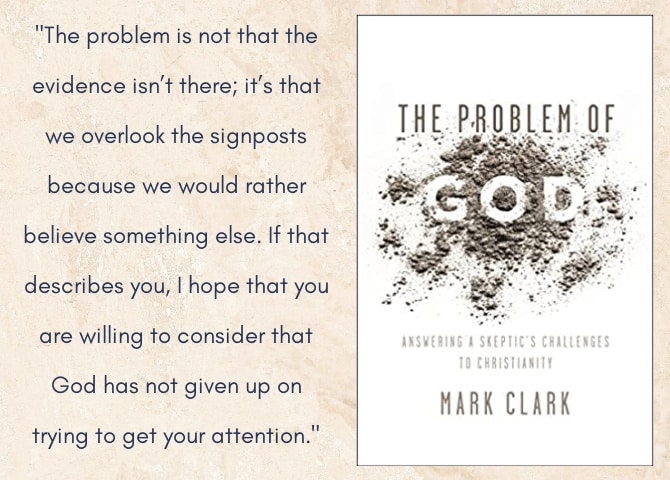
Love Does for Kids, by Bob Goff and Lindsey Goff Viducich: I’ve been a pretty big Bob Goff fan for years (I mean, how can anyone NOT love Bob Goff), but despite having read his books and being a regular listener of his podcast, I only recently learned about Bob’s books for kids that he cowrote with his daughter, Lindsey. I immediately purchased copies of both books, and Charleston and I added a chapter of Love Does to our nightly reading routine.
Like the adult version of the book, Love Does for Kids features short chapters recounting inspiring and entertaining stories from Bob Goff’s wild and wildly love-spreading life. From neighborhood parades and family rituals to meeting with national dignitaries and making friends in unexpected places, Bob’s life as a lawyer, father, teacher, friend, neighbor, and Jesus-loving human has been one giant adventure, and this book brings readers along for the ride. The stories are accompanied by beautiful illustrations, and each story ties in Biblical lessons and truths about character, positivity, perseverance, and most of all, how to receive God’s love and pay it forward in our love for others.
The book is geared towards a middle grade audience, but works as a read-aloud for younger readers as well, and can equally be appreciated as adults; it’s a rare book with nearly universal appeal, and Charleston and I both LOVED it! Every chapter sparked good dialogue and got our wheels turning on how we could begin living and loving BIG like Bob. I was touched by how quickly Charleston warmed to our friend Bob, casually dropping his name and his ideas into our conversations, and asking when we could meet him. I could not have asked for a better reading experience, and we are eager to jump into reading Everybody Always for Kids next.
My Rating: 5 Stars!
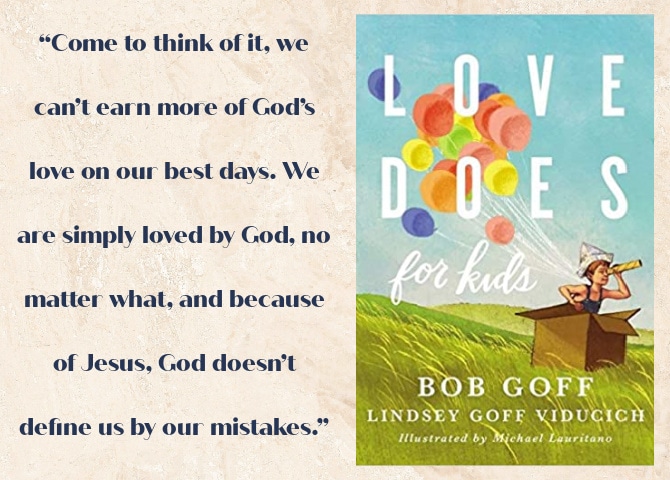
A Circle of Quiet, by Madeleine L’Engle: Madeleine L’Engle is a household name, and while I’ve read her Wrinkle In Time (which I liked, though it isn’t necessarily a favorite), I’ve never delved into any of her other works. This collection of essays—the first of four —has been sitting on my Kindle for years, and I regret not reading it sooner; it is fantastic!
Originally published in 1972, this memoir (which reads like a collection of blog posts) was written from the family’s farmhouse in rural Connecticut, and the writing takes on the quaint and cozy tone of its birthplace. L’Engle meanders through commentary, reflections, and meditations on motherhood, writing, faith, culture, and womanhood. Her essays are equal parts philosophical and practical, always candid, and often humorous. I enjoyed every chapter but the sections discussing literature, writing, and the power of story were for me the most profound.
If I were to write a book, this is what I would want it to be and I loved reading these words from such a wise and insightful individual. Many of the concepts L’Engle explores felt so current, I was shocked when I realized this book was nearly fifty years old. What a gift L’Engle has given to the next generation of women.
My Rating: 5 Stars!
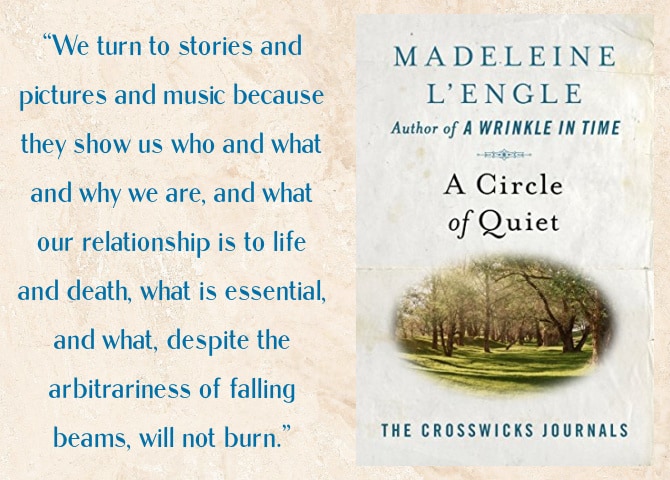
All Things Reconsidered: How Rethinking What We Know Helps Us Know What We Believe, by Knox McCoy: In this humorous and perceptive collection of essays, Knox McCoy—cohost of the delightful Popcast—takes a second look at things he has long believed to be true that might be prime for some reevaluation. Blending personal anecdotes and pop culture references, Knox evaluates everything from the inconsequential (birthdays, kid names, and Big Bird) to the substantial (the Creation story, Heaven and Hell, and prayer) and even the controversial (masculinity, sex scenes, and participation trophies).
Knox’s careful considerations leads to some spicy opinions and some poignant revelations about himself, his beliefs, and his perceptions of culture and the broader world. Each chapter is infused with Knox’s unique brand of self-deprecating humor and witty pop culture references, which add levity to the weightiness of his premise.
The idea behind this book (that the beliefs and ideas we take for granted are worthy of examination) is an important one, and I admire Knox’s willingness to share his own reconsiderations with a broad audience. Knox offers a healthy model of deconstructing his beliefs for the sake of reconstructing them on more solid foundations. As he says, “it’s important to examine our why when it comes to clinging to specific beliefs. Is it because we believe in them so fully and completely that anything less would seem disrespectful? Or is it because we prize the stability of our beliefs above all else, even more than their content?” While I may not align with Knox’s particular conclusions (let’s not even talk about his stance on midday naps!), I enjoyed joining him in his process of reconsideration and loved this book for both the insights and the laughter.
My Rating: 4 Stars.
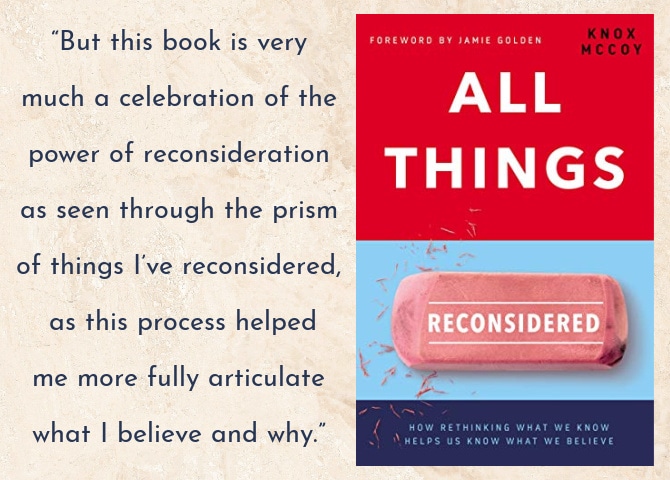
The 6 Needs of Every Child: Empowering Parents and Kids through the Science of Connection, by Amy Elizabeth and Jeffrey Olrick: As parents, I think most of us want to do what is best for our kids. But too often we become so invested in parenting (i.e. following a list of things to do) that we forget that being a parent to our child is all about relationship. In this helpful book, psychologist Jeffry Olrick and his wife Amy help parents get back on track in our relational journeys with our children. Following an overview of attachment styles and explaining the importance of establishing secure attachment to our kids, the Olricks show how such attachment can be developed through meeting kids’ six core relational needs of delight, support, boundaries, protection, comfort, and equipping. Relying on their own experiences, psychological research, and neuroscience, the Olricks define these needs, underscore their importance, and walk parents through how to identify and meet these needs in our kids.
I really loved the relational approach taken in this book and the exploration of how these needs connect to our faith lives. The Olrichs emphasize that even adults have these core six relational needs and they show how these needs can be met through our relationship with the Lord. It was fascinating to see the parallels between attachment science and the love of God that is woven throughout Scripture.
I felt the book could have benefitted from some stronger editing, as parts of the framework were difficult to follow, and not all of the examples seemed to fit the points that were being made. However, I’m very glad that I read this. I found the framework enlightening and applicable, and have been implementing it to understand and meet my kids’ unique needs: since reading the book, I have been able to see where I might be lacking in meeting their needs and other areas where I may be overdoing things a bit. The book helped draw me back to what is most important in this journey with my kids without invoking shame over how I am doing as a parent.
My Rating: 4 Stars.
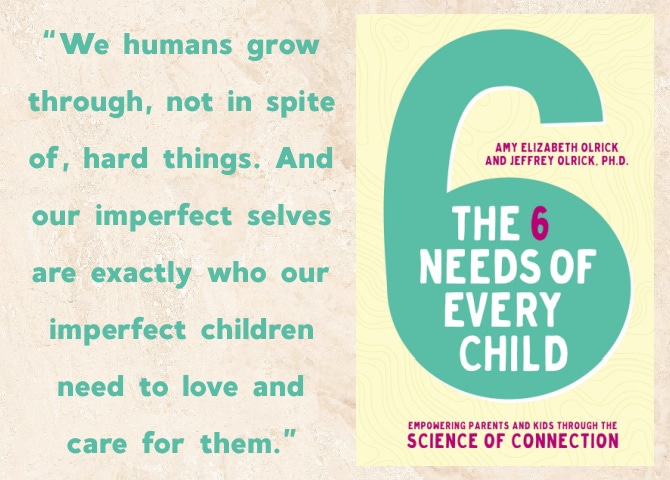
The Rise and Triumph of the Modern Self: Cultural Amnesia, Expressive Individualism, and the Road to Sexual Revolution, by Carl R. Trueman: We are a culture enamored with self and identity, and the recent discussion of late seems to be centered around sexual identity. Why this current obsession? How did we get here? In this exhaustive analysis of this trend, theological historian Carl Truman makes a case for the sexual revolution being a symptom, rather than a cause, of the human search for identity. Trueman traces the roots of the sexual revolution that go back for centuries, examining psychological paradigms and sociological frameworks and tying past movement and trends to the present manifestations of the concept of self. He shows how Christians have played an (often unknowing) role in these shifts and helps us understand how we are to respond.
This book is dense and not an easy read, but the concepts are fascinating and enlightening. Trueman gave me a better understanding of past and present ideologies related to the self and sexuality. Though it was somewhat frightening to see how some of our current “craziness” related to these concepts has such deep roots, it was also heartening to realize that a lot of these seemingly new ideas are not coming out of nowhere; in other words, we are currently just experiencing a new iteration of something that has been going on for generations. Trueman is unapologetic about his stance on certain issues but offers clear and unbiased analysis of other views as well. If you find yourself confused and wanting to understand the sexual discussions prevalent in current culture, I would highly recommend picking this one up.
My Rating: 4 Stars.
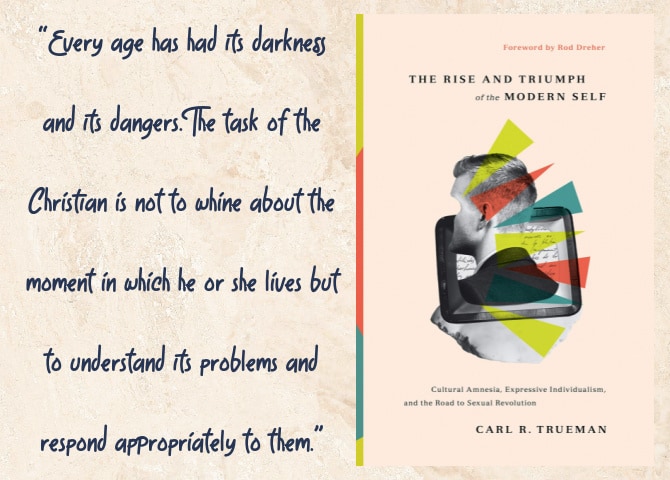
Next Monday I’ll be back with reviews of eight novels I’ve read in the past month. Until then, happy reading!